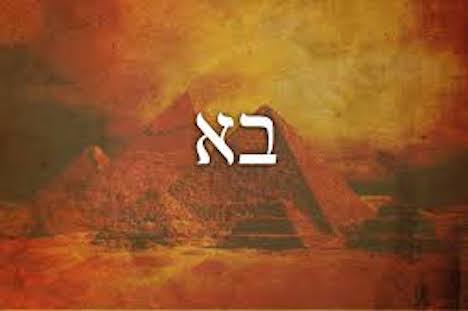‘…on the tenth of this month, they should take for themselves-each man- a sheep for the household… and they should guard them until the fourteenth of this month, and they should slaughter it– all the assembly of the Congregation of Israel- in the afternoon…
The young nation was instructed to take the blood from the sheep they had just slaughtered and eaten- and apply it to their doorposts- a sign of allegiance to Hashem, and thus a deterrent to the as destructive forces let loose outside. Not only was this public display a sign that B’nei Israel had fulfilled God’s will, but it was also a show of their faith in Him. As we know, ancient Egypt was steeped in idolatry; all types of idols were respected by the masses, each Pharaoh promoted national idols that he admired, and even the Pharaoh himself was seen and treated as a deity connected with higher and lower worlds.
Above all idol figures, though, one became the enduring image of idol worship in Egyptian culture: the sheep. And it was exactly this figure that Hashem wanted His budding Nation to slaughter and eat. There could be no greater disrespect to this idol than- and nothing that could enrage the Egyptians as much as- to publicly buy a sheep, bring it home several days in advance and then slaughter and eat it in groups, with the full knowledge of the Egyptians- and all to serve the God that the Egyptians had been trying to fight and deny all these years! And B’nei Israel followed this commandment to the last detail, despite the obvious danger involved. And, of course, Hashem protected His Chosen People completely.
As we’ll see, this commandment would also stand as a vital source of merit for the nation.
This mitzvah was so important, in fact, that without it we would never have left Egypt!:
Rabbi Matia ben Charash would say: it says,
‘And I pass over you, and look at you, and behold! It is your time, the time of beloved ones…’
-Yechezkel, 16:8
-(Meaning that) The time that Hashem had sworn to Avraham at which He would redeem his descendants had arrived- but they had no mitzvot that they could involve themselves in so that they could (merit to) be redeemed… and so Hashem gave them two mitzvot… the mitzvah of the Pesach Sacrifice and the mitzvah of Brit Milah (cirumcision), as it says:
‘And I pass over you and see you rolling in your bloods… and I tell you: ‘By your bloods- you will live!’
(-Yechezkel, 16:6)’
-Midrash
-In other words, the special mitzvot of Pesach and Milah were the ‘tools’ Hashem used in bringing about the Redemption.
If the above verses seem familiar, that’s because they are: we recite them in the Haggadah on Pesach- and at a Brit Milah.
Meanwhile, this is an interesting concept, to be sure, but some basic questions need answering:
- Why were these the two mitzvot Hashem gave them, more than any others He could have taught and commanded?
- What’s the deeper meaning of the ‘bloods‘ of these mitzvot? Is it a coincidence that both involve blood of some kind, or is it something about blood that made these mitzvot uniquely capable of meriting salvation?
- ‘Your bloods’ implies that both Milah and the Pesach involved B’nei Israel’s blood. Although this was true of Milah, the Pesach saw them spilling the sheep’s blood when they slaughtered it; where was the Jewish blood there?
We should note that the command of Milah was actually given in conjunction with the command to take the Pesach offering:
‘they circumcised themselves that (same) night, as it says, ‘rolling in your bloods’- in two bloods- and it also says,
‘And you also, by the blood of your Brit I sent out your imprisoned ones, from a pit without water.’
(-Zecharyah, 9:11)
-Rashi, Bo 12:3
-Apparently, not only were these two mitzvot necessary, but
they were-and are- deeply connected, so that one is lacking without the other; only performed together could they bring Bne Israel’s salvation. We need to first know the meaning of these two mitzvot, if we are to understand how they are interrelated…
Hashem Yitbarach wanted to establish within the Nation He had separated to be called by His Name, a permanent sign on their body- to differentiate them from other nations in their bodily form, just as they are different in the form of their soul…
-Sefer Hachinuch, Parashat Lech Lecha
-The Milah is a sign of our unique status as Hashem’s Nation- and also a reminder of the responsibility this status carries, as the Sefer Hachinuch continues:
Subcribe to The Jewish Link Eblast
… And Hashem wanted the Chosen Nation to perfect its own nature, and He wanted the perfection to come through Man himself- and didn’t just create him complete (with Milah) at birth, to hint to Him that just as the perfection of his body comes through him, so too he is capable of perfecting the form of his soul, through productive deeds…
(-ibid.)
-Powerful stuff. We are different, and we need to behave that way. And the elevated level we occupy as Hashem’s People doesn’t just mean that there’s one specific, baseline level that our actions must adhere to. Rather, our special status requires us to work, to push ourselves in constantly improving ourselves; with each action, with each step we take in becoming better people and more dedicated to serving God, we slowly redefine our ‘levels’. If we first identify who we are and what we are about, we can comitt to doing the right thing with great dedication. This is what the Milah teaches us.
Now that we have gained some understanding in the mitzvah of Milah and have begun to explore the Pesach sacrifice as well, I hope we can tie everything together- and answer our questions- next week.





